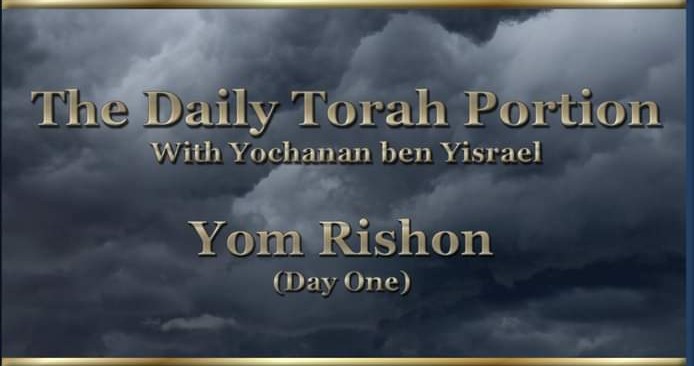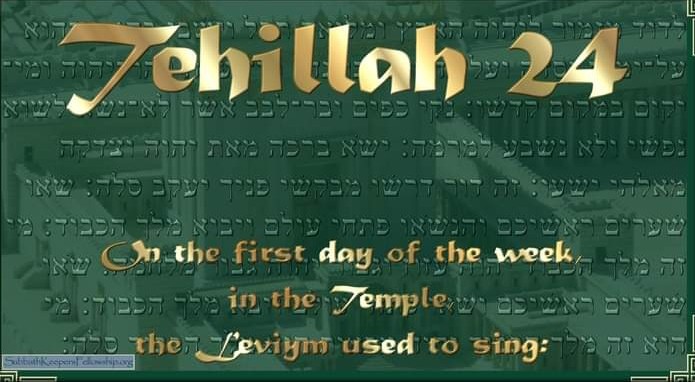Watch
Events
Articles
Market
More
My Sabbath post this time will be a link to another post that was a blessing to read. ?
https://gracesgrose.com/the-un....usual-in-the-everyda
#sabbathposts 2024/01/13



Sabbath Keepers Fellowship & Prison Ministry
Min Hazaqen Torah Study Group on Facebook
Christi Banks
Yochanan Ben Yisrael
15 Bo – Day 1
Sh’moth 10:1-11
And YHWH said to Mosheh, “Go in to Pharaoh, for I have hardened his heart and the hearts of his servants, so that I show these signs of Mine before him, and that you relate in the hearing of your son and your son’s son what I have done in Mitsrayim, and My signs which I have done among them. And you shall know that I am YHWH.”
And Mosheh and Aharon came in to Pharaoh and said to him, “Thus said YHWH Elohim of the Hebrews, ‘Till when shall you refuse to humble yourself before Me? Let My people go, so that they serve Me.
‘Or else, if you refuse to let My people go, see, tomorrow I am bringing locusts within your borders.
‘And they shall cover the surface of the land, so that no one is able to see the land. And they shall eat the rest of what has escaped, which remains to you from the hail, and they shall eat every tree which grows up for you out of the field.
‘And they shall fill your houses, and the houses of all your servants, and the houses of all the Mitsrites, which neither your fathers nor your fathers’ fathers have seen, since the day that they were on the earth to this day.’” Then he turned and went out from Pharaoh.
And Pharaoh’s servants said to him, “Till when would this one be a snare to us? Let the men go, so that they serve YHWH their Elohim. Do you not yet know that Mitsrayim is destroyed?”
And Mosheh and Aharon were brought back to Pharaoh, and he said to them, “Go, serve YHWH your Elohim. Who are the ones that are going?”
And Mosheh said, “We are going with our young and our old, with our sons and our daughters, with our flocks and our herds we are going, for we have a festival to YHWH.”
And he said to them, “Let YHWH be with you as I let you and your little ones go! Watch, for evil is before your face!
“Not so! You men go now, and serve YHWH, for that is what you desired.” And they were driven out from the presence of Pharaoh.




Submitting All To YHVH
References
1 Corinthians 14:33 / 1 Timothy 2:2 / Psalm 91:1 / 1 Peter 5:5 (AMP) / Matthew 6:10 / James 4:7 / 1 Samuel 15: 22, 23 (TLB) / Psalm 51:6, 7 (TLB) / Colossians 1:13, 14 (NIV) / Matthew 10:38, 39 (AMP) / John 16:33 / John 15:15 / Revelation 12:11
Abba, You are the Most High Supreme Authority – a YHVH of order. You have instituted other authority structures that will support healthy relationships and maintain harmony. I surrender my all, and my free will to You that I may find protection and dwell in Your secret places, my Most High YHVH. Abba thank You for pastors, ministers, leaders and every one of Your believers, who are submitted to You and who are examples to others who is in need of Your Comfort and Love. Adonai, You know how sinful and rebellious we all are, me included, and I ask Your forgiveness for manipulating circumstances and people – trying to do my own will and to get things my own way. I give You my will and ask that Your Will be done in my life as it is done in heaven. Abba, when I feel that my life is spiralling out of control, help me to bind my mind to the Mind of Moshiach and my control to the control of Ruach HaKodesh. I loose my mind from obsessive thought patterns that try to confuse me. I know that obedience is far better than sacrifice. I know that You are more interested in me listening to You, than offering of material things. I believe that rebellion is just as bad as witchcraft and stubbornness as bad as worshipping idols, and I believe when I am rebellious and stubborn, I commit adultery against You and Your Word. Please forgive me for those things. Abba, You deserve honesty from the heart and utter sincerity and truthfulness. O Abba, fill me with Your Wisdom! Sprinkle me with the Blood of the Lamb and cleanse me and wash me so I can be whiter than snow! You have rescued me from the dominion of darkness and brought me into the Kingdom of Your beloved Son Yeshua Moshiach, in Whom I have redemption, the forgiveness of sin. Adonai, I will follow You with every breath, with every step and with every moment, for I Love You and need You. I yield all my desires that are not in Your plans for me. Even in the midst of fearful moments, I submit and trust everything, including my future to you. Teach me to be Your disciple and to take up my cross and follow You. Abba, You gave Yeshua to be my Example, and after He was taken up to be at Your Right Hand, You gave me Your Ruach Kodesh to be my Helper and my Guide. There are uncountable temptation, trials and tribulations in this world today, but with Yeshua that overcame the world and Your \Ruach Kodesh in me, I am of good cheer that I have the armour to withstand all of that. Yeshua is the Way, the Truth and the Life and I will be His servant. What I do ask is that You guide me and help me through the process of surrendering my all to You, my life, my household, my will, my finances, my thoughts and all my decisions. I ask in exchange of this surrender a renewed spirit and a willing obedient heart. I ask that You heal my deafness that I can hear You and my blindness that I can see Your Greatness. I belong to Moshiach, the Anointed One, Who breaks down and destroys every yoke of bondage. In His Name and in obedience to Your Will Abba, I submit to the control and direction of Ruach HaKodesh Whom You sent into my life. As I surrender all to You, I believe that I am Your child. I am a successful winner through the Blood of the Lamb. Thank You my Most High King. Amein.



Sabbath Keepers Fellowship & Prison Ministry
Min Hazaqen Torah Study Group on Facebook
Christi Banks
Yochanan Ben Yisrael
Tehillah 24 – Day 1 (Yom Rishon)
The earth belongs to YHWH, And all that fills it – The world and those who dwell in it.
For He has founded it upon the seas, And upon the waters He does establish it.
Who does go up into the mountain of YHWH? And who does stand in His set-apart place?
He who has innocent hands and a clean heart, Who did not bring his life to naught, And did not swear deceivingly.
He receives a blessing from YHWH, And righteousness from the Elohim of his deliverance.
This is the generation of those who seek Him; Ya‛aqoḇ, who seek Your face. Selah.
Lift up your heads, O you gates! And be lifted up, you everlasting doors! And let Melek Hakavod come in.
Who is this Melek Hakavod? YHWH strong and mighty, YHWH mighty in battle.
Lift up your heads, O you gates! Even lift up, you everlasting doors! And let Melek Hakavod come in.
Who is this Melek Hakavod? YHWH of hosts, He is Melek Hakavod! Selah.




Here's today's sermon archive to review or share with others. The sermon was called, Standing Down the 'Gates of Hell': https://firstfruits.cc/blog/20....24/01/13/standing-do


